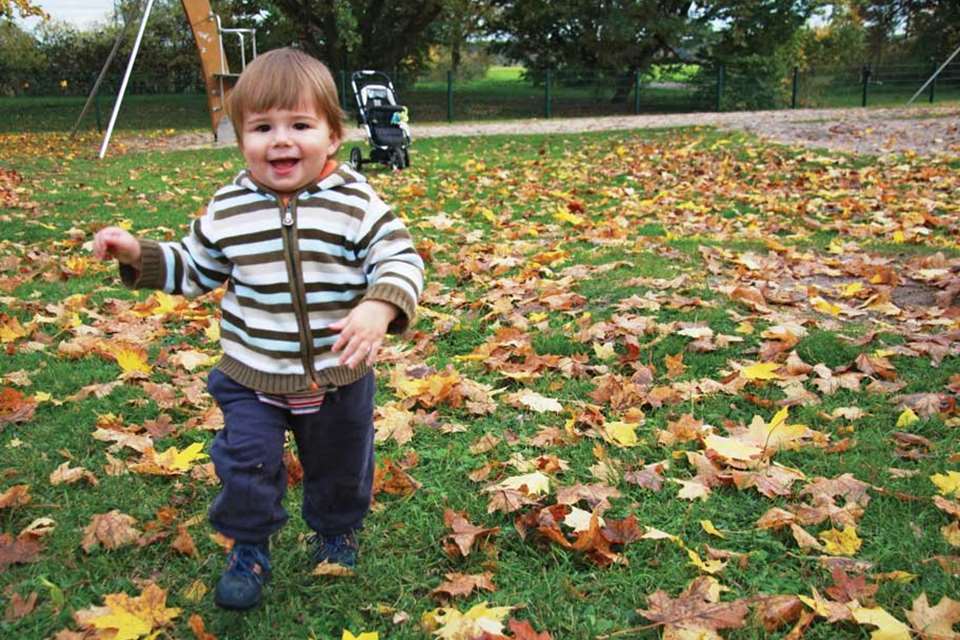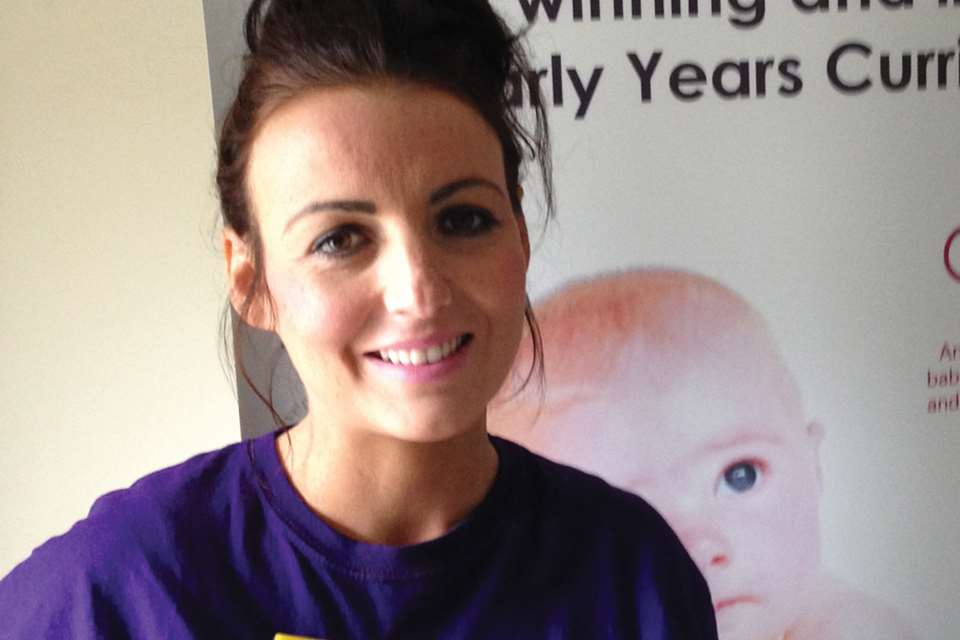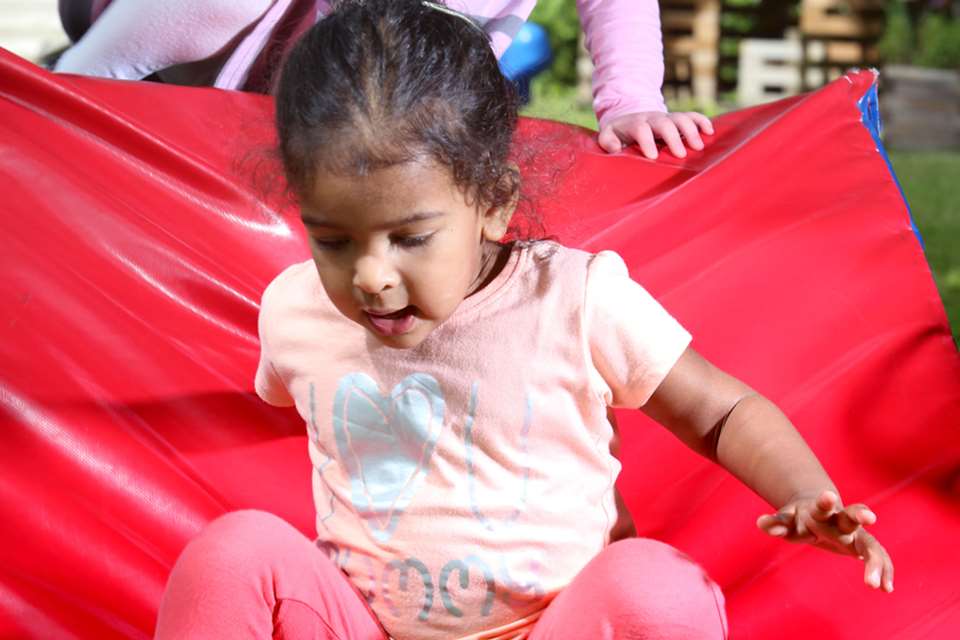Enabling Environments: Movement Play - Body language
Annette Rawstrone
Monday, March 21, 2016
Encouraging children to use their bodies in any way they want stimulates their physical and brain development and has a noticeable beneficial effect on behaviour, writes Annette Rawstrone

Children crawling over and under the tables, playing tug of war with stretchy material, doing forward rolls on mats, dancing with ribbons, hanging upside down on A-frames in the small outdoor area and spinning each other around – these are typical activities for the children at 1a Children’s Centre in Camden, London, who are encouraged to use all parts of their bodies in order to stimulate their physical and brain development (See ‘For Mind and Body’, Nursery World, 7 September 2015).
Staff were left amazed at how concentrating on the repetition of simple movements benefited the children, including improved eye contact, balance and motor skills, when they became part of a pilot study with developmental movement therapist Bette Lamont.
Ms Lamont was invited from Seattle in the US to London in 2008 by Carol Archer, an early years advisory teacher for Camden Early Years Integrated Service. ‘While we all know that being physically active is important for children in terms of health, many people are not so keenly aware of how significant movement patterns such as tummy time, crawling, hanging and spinning can link the body with the brain and help children to grow to their optimum development,’ explains Ms Archer.
She undertakes movement play training in Camden and is encouraging early years practitioners to engage in vigorous activities with the children and give more attention to certain types of movements that have been shown to impact on later learning and development (see case studies, overleaf).
‘Initially we were cynical when we started the pilot but after seeing the dramatic effects of movement play it is now embedded in our practice,’ says head of centre at 1a Children’s Centre Marilyn Sherwood-Chilton. ‘The biggest benefit has been around communication and co-operation in children. We encourage them through the day to use their bodies in any way they want, and their behaviour has changed dramatically. We are observing more social interaction. We no longer ask children to sit still because we understand that their brains are telling them to fidget, it’s a process every young brain needs to go through and it enables them to be more able to concentrate when they start school.’
One two-year-old, an early walker, was a frequent biter and his parents were considering removing him from the centre. He stopped dribbling, his speech improved and he ceased biting in just two weeks after Ms Lamont suggested that his key person and parents regularly rub him gently around his mouth with different textured objects in order to replace stimulation that he’d missed as a baby through reduced floor time.
All the staff actively, regardless of shape or size, participate in the movement play – while some are happy to run and roll alongside the children, others engage in role play and encourage the children to creep and crawl, perhaps even over them.
A favourite with the children is being squashed between two large cushions, which, as well as being great fun, helps to develop their spatial awareness and proprioceptive system by becoming more aware of the extremities of their limbs.
WRIGGLING AND MOVING
Rather than investing in expensive equipment, Ms Sherwood-Chilton says that staff are the important resource. ‘Movement happens everywhere at our centre,’ she says. ‘We don’t have a big outdoor area but we can move furniture and have rough and tumble time or play with the parachute and balls.’
She believes that it is important to explain to parents why they are investing so much time in movement play, so they include information in their welcome pack and encourage parents to ask questions.
‘We explain to them that when their children are wriggling and moving they’re not being naughty but need to experience these movements in order to develop,’ she says. ‘We encourage parents to allow their children to jump on beds and walk along walls on their way to nursery.’
Ms Archer continues to be astounded and excited by what she observes children doing. ‘I was visiting a nursery recently when I saw a three-year-old hanging from a monkey bar with one hand while spraying water from a bottle with the other,’ she recalls. ‘She’d obviously had lots of opportunities from birth to move and experiment in order to become so physically confident.’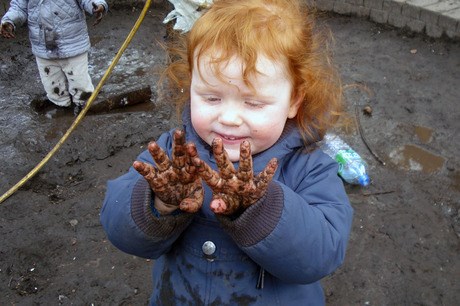
CAMDEN PILOT CASE STUDIES
Katharine Browne, manager, Collingham Gardens Nursery
‘We’ll often put music on and all jump and dance and have a great time. A favourite with staff and children is to clear the room and cover the floor with shredded paper donated from the local health centre. We throw it, roll in it, dance around and generally have terrific fun. Children and staff are all happy and relaxed afterwards.
‘Physical activity is very much part of our ethos because, despite being in central London, we have a large, unique outdoor space – it’s an 18th century graveyard surrounded by tombstones. Attending a training day four years ago on movement play really upped what we do with the children.
‘We now focus on the different movements such as twisting, spinning and rolling, as well as running and jumping, and identify those children who are more sedentary and encourage them to move more. It’s so important for the children to access large physical play, not only to keep healthy but to build many skills. For example, to start writing they need to develop fine motor skills, which can be gained from climbing an A-frame and using their hands to turn and manipulate.
‘Most of the time we incorporate movement play informally – whether that’s transporting buckets of puddle water, building dens or crawling on the floor building train tracks – but we also have Big Gym sessions twice a week, often outside. We have equipment such as a balance beam, hoops to spin around their waists or jump with, different sized balls to roll over or throw, crawl tunnels, A-frames to climb, move over or hang from. We do things like set up obstacle courses for the children to tackle, and commando crawling. We also have a dance teacher who comes in weekly.
‘It requires an enthusiastic staff team who are receptive to being outside in the rain and mud and good at evaluating what the children are doing and planning for further movement. They need to be always questioning whether children have enough room and be amenable to move furniture if children want to roll on the floor. We do a lot of floor work and move the tables under a canopy outside to create space. Once we ended up with a 20ft train track taking over the room.’
Teresa Barker, head teacher, Agar Children’s Centre
‘Children need to be allowed to move before they are ready to learn. They need to be comfortable in their own bodies in order to develop the skills for future learning such as social skills and fine motor skills. We were fortunate to receive training from Carol Archer when we opened six years ago, so movement play has always been embedded in our centre and happens daily, inside and out.
‘If children want to roly-poly or jump and roll on cushions then we give them the space and time to do so. It’s not often that you hear our staff tell a child to be careful, get down or don’t do something. Staff have the confidence to step back and allow the children to experiment, while they are close by to make suggestions or role-model if necessary.
‘We have safety surfaces under high equipment and equipment is well-maintained so we can allow the children to have rough and tumble and take reasonable risks in a safe environment.
‘They grow up being confident to try and climb high, or swing from the monkey bars. The children benefit from being comfortable in their own bodies, mastering their fears and being open to new challenges. The majority live in flats and have limited space to use up their energy. By giving them opportunity to stretch, climb and roll instead of expecting them to sit down and concentrate, we are enabling them to develop their gross and fine motor skills and be ready to take on information.
‘Visitors are surprised at what even our youngest children are doing, which makes us appreciate how physically confident they are. New children are often nervous of going in the spinning cones, hanging from ropes or climbing the vertical wall, but it isn’t long before they are giving it a go with staff encouragement and support.
‘We are lucky to have a large outdoor area but regularly monitor our environment using ITERS and ECERS to ensure it doesn’t get crowded. We make sure that children always have the space to lie down, stretch and crawl. Each room plans a movement play activity each week, such as spinning, and we have a small permanent soft play area set up as well as free flow between indoors and outside.
‘New parents do express concerns that their children will be outside all the time and won’t learn, but we have the confidence to explain to them that they are gaining the basics to become active, eager learners.’
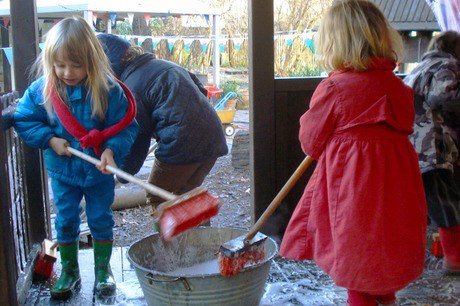
MORE INFORMATION
• ‘For mind and body’ by Carol Archer and Professor Iram Siraj, www.nurseryworld.co.uk/nursery-world/feature/1153558/enabling-environments-movement-play-for-mind-and-body
• Children Who Need Help by B Lamont (2007). Available from the author’s website at http://neurologicalreorganization.org
• Encouraging Physical Development Through Movement-Play by Carol Archer and Iram Siraj (2015). Sage Publications
• The Well-Balanced Child: Movement and early learning (second edition) by Sally Goddard Blythe (2005). Hawthorne Press


